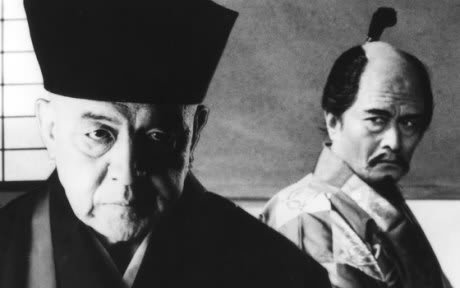The great Hiroshi Teshigahara's second last film, released in 1989, is an insular, ponderous affair, albeit one with flashes of subtle beauty and brilliance.
A relatively direct historical drama concerned with the relationship between a warlord and a tea-master, Rikyu lacks the oblique visual metaphors and universal themes of human desire and fear that made earlier works, like Woman in the Dunes, so impactful.
That's not to say that this meditation on the contentious relationship between politics and art isn't an effective piece in its own right; it most certainly is. But, for outsiders more drawn in by emotional storytelling than history lessons, it's a bit of a tough slog.
Set in 16th-century Japan, Rikyu follows the unique bond that develops between the titular tea-master (Rentaro Mikuni) and the famous Shogun, Hideyoshi Toyotomi (Tsutomu Yamazaki), after the peasant turned military ruler came in to power following his victory over Akechi Mitsuhide, the assassin of Oda clan leader, Oda Nobunaga.
Teshigahara is even less concerned with depicting the heat of battle than the show-runners of Game of Thrones. Every act of violence occurs between scenes and is related through conversation, or, in one cumbersome case, through text set against a backdrop of burning embers.
The meat of the film deals with the tensions that flare between Hideyoshi and his fellow warlords due to the boastful Shogun's unrealistic colonial ambitions and his reliance on the frank counsel of Rikyu, a mere artisan in the eyes of nobility, despite being recognized as a grandmaster of his craft. Nobody else has the guts to point out that a campaign to conquer both Korea and China will undoubtedly be more taxing than was putting down an uprising on home soil.
There are many characters to keep straight and marginalized situations to follow – particularly Hideyoshi's shifting attitude on relations with European delegates hocking Christianity – to the point where the central trajectory of the clash between the politician's egotistical ambitions and the artist's pompous idealism is knocked off course more than a few times.
Rikyu isn't among the most technically accomplished of Teshigahara's efforts either. Except for a few eye-catching shots, it's a visually unremarkable film. The cinematography effectively captures the deliberately measured pacing of the tea ceremony but is otherwise quite bland.
Furthermore, and perhaps as a result of being more comfortable working in black and white, the colour palate he uses is somewhat of a muddled haze and the lighting is often dim and indistinct. It's possible that this was the obviously very intelligent director's intent but, if so, it's difficult to appreciate and lacks clear thematic purpose.
With its relatively obvious zen musings and primarily instructive depiction of a specific phase of Japanese history, Rikyu ranks among the lesser offerings of a masterful filmmaker.
Rikyu screens at the TIFF Bell Lightbox as part of the Japanese Cinema of the Eighties retrospective at 6:30pm on April 5th, 2013.
(Capitol)A relatively direct historical drama concerned with the relationship between a warlord and a tea-master, Rikyu lacks the oblique visual metaphors and universal themes of human desire and fear that made earlier works, like Woman in the Dunes, so impactful.
That's not to say that this meditation on the contentious relationship between politics and art isn't an effective piece in its own right; it most certainly is. But, for outsiders more drawn in by emotional storytelling than history lessons, it's a bit of a tough slog.
Set in 16th-century Japan, Rikyu follows the unique bond that develops between the titular tea-master (Rentaro Mikuni) and the famous Shogun, Hideyoshi Toyotomi (Tsutomu Yamazaki), after the peasant turned military ruler came in to power following his victory over Akechi Mitsuhide, the assassin of Oda clan leader, Oda Nobunaga.
Teshigahara is even less concerned with depicting the heat of battle than the show-runners of Game of Thrones. Every act of violence occurs between scenes and is related through conversation, or, in one cumbersome case, through text set against a backdrop of burning embers.
The meat of the film deals with the tensions that flare between Hideyoshi and his fellow warlords due to the boastful Shogun's unrealistic colonial ambitions and his reliance on the frank counsel of Rikyu, a mere artisan in the eyes of nobility, despite being recognized as a grandmaster of his craft. Nobody else has the guts to point out that a campaign to conquer both Korea and China will undoubtedly be more taxing than was putting down an uprising on home soil.
There are many characters to keep straight and marginalized situations to follow – particularly Hideyoshi's shifting attitude on relations with European delegates hocking Christianity – to the point where the central trajectory of the clash between the politician's egotistical ambitions and the artist's pompous idealism is knocked off course more than a few times.
Rikyu isn't among the most technically accomplished of Teshigahara's efforts either. Except for a few eye-catching shots, it's a visually unremarkable film. The cinematography effectively captures the deliberately measured pacing of the tea ceremony but is otherwise quite bland.
Furthermore, and perhaps as a result of being more comfortable working in black and white, the colour palate he uses is somewhat of a muddled haze and the lighting is often dim and indistinct. It's possible that this was the obviously very intelligent director's intent but, if so, it's difficult to appreciate and lacks clear thematic purpose.
With its relatively obvious zen musings and primarily instructive depiction of a specific phase of Japanese history, Rikyu ranks among the lesser offerings of a masterful filmmaker.
Rikyu screens at the TIFF Bell Lightbox as part of the Japanese Cinema of the Eighties retrospective at 6:30pm on April 5th, 2013.
